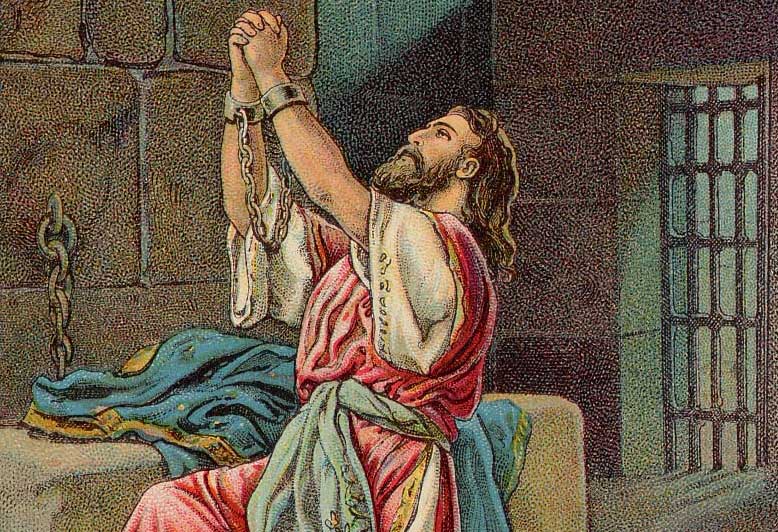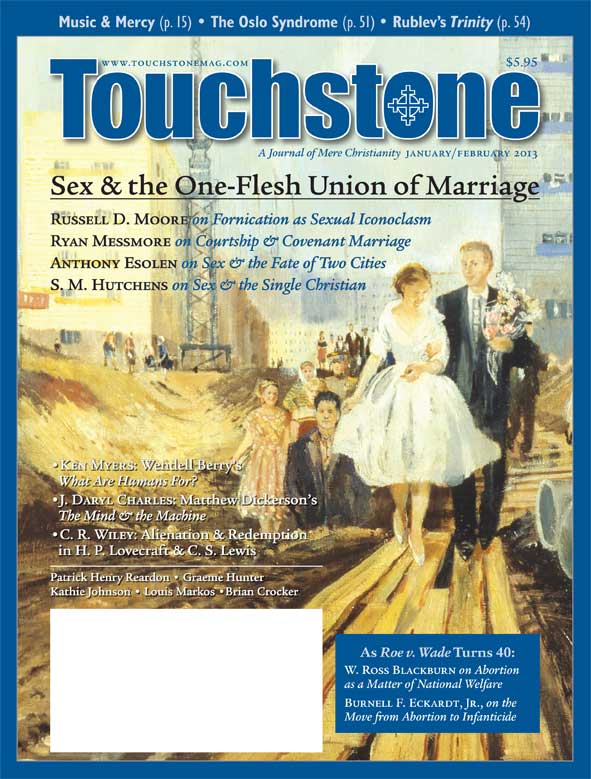View
The Destroyer of Peace
W. Ross Blackburn on Abortion as a Matter of National Welfare
Every election addresses issues crucial to the life of the nation. Typical of years past, the economy, national security, and health care commanded the attention of voters in 2012, and the candidates were expected to propose solutions for each issue. Yet, our economy is not going to be saved simply by changing our tax policy or spending habits, nor is our nation going to be secured by tougher policies toward Iran or Russia.
Although neatly (and with great reductionism) framed as a "women's rights" issue, abortion will have far more power over the welfare of our country than most of us have imagined. Here's why.
There is a peculiar passage in the Old Testament relevant to America's political landscape: "Do not pray for the welfare of this people. . . . I will consume them by the sword, by famine, and by pestilence" (Jer. 14:11–12).
This is unusual, that God would explicitly forbid prayer for his people. Why? What would warrant such determined and irreversible judgment? The answer: "I will make them a horror to all the kingdoms of the earth because of what Manasseh the son of Hezekiah, king of Judah, did in Jerusalem" (Jer. 15:4). What did Manasseh do? Of all the other wicked kings in Israel and Judah, there is one practice, and only one, unique to Manasseh: the large-scale shedding of innocent blood. Other kings were guilty of shedding innocent blood, but only Manasseh is charged with doing so on a large scale.
The Old Testament tells the rest of the story. As promised, Judah was besieged by Babylon and taken into exile. Their national security was broken, their economy shattered, their health care in ruins. Their hopes as a nation—for safety, prosperity, and health—were gone.
Surely this came upon Judah at the command of the Lord, to remove out of his sight, for the sins of Manasseh, according to all that he had done, and also for the innocent blood that he had shed. For he filled Jerusalem with innocent blood, and the Lord would not pardon. (2 Kings 24:3–4)
Intertwined Moral Concerns
The narrative of Manasseh raises a notion with significant traction in our culture—that of the "single issue" voter, popularly caricatured as so concerned about one particular issue that he is blind to, or unconcerned with, others. Shaun Casey, President Obama's former religious advisor, said something interesting back in 2008 concerning the younger generation: "those folks are [not] getting more liberal on abortion or same-sex issues. It just means they're less inclined to be single-issue voters. The moral basket of issues is larger than just abortion and gay marriage." For Casey, the strength of American youth lay in the breadth of their moral concerns.
Certainly the "moral basket" is large. But Casey's comment implies that moral issues can be divided and categorized in such a way that one issue can be dealt with apart from others. But what if, in this large and varied basket, issues are interdependent? What if there are some issues that affect all the others? The fallacy of Casey's perspective is that one cannot be focused and comprehensive at the same time. If there is one rotten apple in the basket, one does not suppose that a focused effort to remove that particular apple is made at the expense of the other apples. There is a particular order of importance that must be respected, for the sake of the whole. Failure to focus will, over time, cause all to be lost.
Is public policy that permits abortion in America on the same moral plane as Manasseh's practice in the Old Testament? It depends on how one views the annual killing of roughly 1.2 million children. The answer to that question, of course, will determine what priority in the moral basket abortion ought to have. Worthy of sober consideration are the words of Nancy Harvey: "Some of us believe that it is wrong to kill innocent people, and this was the evil of Nazi Germany. Others think that Hitler made a mistake in his categories. It is wrong to kill Jews and Gypsies, but acceptable to kill the unborn and severely disabled."
Greatest Destroyer
According to a September Gallup poll, 21 percent of self-identified pro-life Americans said that they would only vote for a candidate who shared their perspective on abortion. That suggests that for up to 79 percent of pro-life voters, abortion is just one of many issues to consider, or perhaps not an important issue at all.
But what if abortion is connected to everything else? What if, like Judah of old, America's national security, economy, health care, and the many other things about which we are rightly concerned are inseparable from abortion? The Old Testament proclaims that the shedding of innocent blood is never a single issue. It is not a zero-sum affair. One does not give up a concern for pressing issues in our time by remembering the unborn. Rather, the implication is that protecting the unborn is actually the way to begin addressing those other concerns.
Mother Teresa saw this with striking clarity, and articulated the matter in a way that makes clear the connections that 40 years of legal abortion have obscured for many of us:
I feel that the greatest destroyer of peace today is abortion, because it is a war against the child—a direct killing of the innocent child—murder by the mother herself. And if we accept that a mother can kill even her own child, how can we tell other people not to kill one another? . . . By abortion, the mother does not learn to love, but kills even her own child to solve her problems. And by abortion, the father is told that he does not have to take any responsibility at all for the child he has brought into the world. That father is likely to put other women into the same trouble. So abortion just leads to more abortion. Any country that accepts abortion is not teaching the people to love, but to use any violence to get what they want. That is why the greatest destroyer of love and peace is abortion.
For Mother Teresa, abortion is not a single issue, but gets to the very heart of what it means to be human, and to live with one another. It touches everything else.
Mercy & Help
In reflecting upon the Scripture's perspective on shedding innocent blood, we would do well to reflect on two matters. Although downplayed in our culture, abortion takes a tremendous toll on those involved, particularly mothers and fathers, and has left much devastation and pain in its wake. Jesus' words, "Come to me, all you who are weary and heavy laden, and I will give you rest" (Matt. 11:28), are surely directed to those burdened with the guilt of abortion. Additionally, the Church does well to emulate the example of Mother Teresa, and even to echo her own plea: "Please don't kill the child. I want the child. Please give me the child. I am willing to accept any child who would be aborted, and to give that child to a married couple who will love the child, and be loved by the child."
If Mother Teresa could save over 3,000 children from abortion in Calcutta, as she claimed, surely we can do likewise. There are, of course, many who do this—pregnancy centers, churches, and other families and individuals who open their homes to foster or adopt children—but there is more to be done. In our day, this is one of the ways we fulfill the biblical command to "defend the fatherless, and plead for the widow" (Is. 1:17).
Being a "single issue" voter need not mean that one is narrow. For instance, to say that I will not vote for a racist, or a sex offender, regardless of his platform, does not make me narrow-minded or thoughtless. We all have certain non-negotiables—single issues—that disqualify someone from our support, regardless of other factors. The question is whether abortion should be one of them.
Abortion is not a single issue. And the Lord will not permit it to continue indefinitely. The single issue is the welfare of our nation, for which we yet must pray. •






